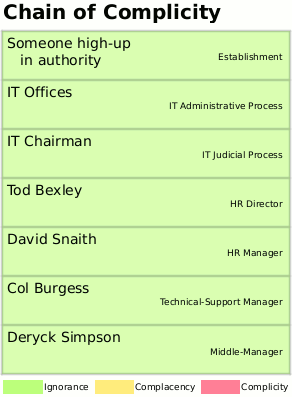
 |
|
| Mobile-sized | ||
| This site: | ||
| Home | ||
| Copyright | ||
| Let the Devil Wear Black: | ||
| Briefly. | ||
| ||
| Additional Resources... | ||
| James Linden: | ||
| Background | ||
| Contact | ||
Resources - Linden’s Second Principle
Complacency becomes complicity.
Chapter 17
Where the opportunity to ‘get rid of someone’ came from is not information that I have, although there clearly was a company policy of getting rid of people.
This was hinted at at the rumour level before anything too irreversible happened by people suggesting that such a scheme existed but more importantly, one person, who is not mentioned explicitly in the book and whose real name is Peter Borrel, told me that it did exist and had manifested itself at other company sites.
In addition, the union rep, James Markfield, told me that similar things had been going on on other sites an they would like to put a stop to it. Of course, the contact on the inside of the HR department making it clear that the whole thing was corrupt just confirmed everything.
Once the original idea had been put into place, all of the way through this story, we have seen opportunities for those who had become involved to put a stop to it — once they found out that something fraudulent or corrupt was happening, to put an end to the process. But they didn’t.
At each level, stopping the process as soon as they realised it was corrupt would have meant that they could get off either completely or lightly as they would have been seen as acting as soon as they actually knew anything, although doing so would have meant that everybody below would have got into trouble to some degree, dependent upon the distance from acceptable behaviour they had needed to travel up to that stage.
It was far easier for them to pretend that nothing untoward was happening — perhaps using that to justify to themselves that they were doing the right thing — and who knows, it might just stop, the person who has had their life messed up would just go and do something else and nobody would get into trouble for it all. Their complacency then necessarily becoming complicity as it continues to grow, like a cancerous tumour.
Clearly, thinking along the lines of ‘just ignore it and it will go away’ is not a strategy that works with any cancerous tumour, real or metaphorical.
So, how does this sort of thing happen? Everything was all right to start off with — I was happy in my job and I enjoyed doing it. There was an opportunity from the company opportunity to get rid of employees as stated by Peter Borrel and Deryck Simpson thought that I would be an easy or useful option.
- He regarded me as of less worth than himself — his passion for his religion probably reinforced that notion and it was certainly supported by the way he treated me regarding respect and material things such as wages and so on;
- I was a safety inspection co–ordinator that took safety seriously and as we all know from safety inspections, pre–emptive safety could cost money;
- As manager, he was supposed to be in charge, not some set of legal requirements regarding safety that could be forced upon him by an underling;
- He could re–shape my working environment to make it look superficially as though something untoward was going on and, if it all went according to plan, it didn’t have to resist closer inspection;
- I knew too much and he thought of himself as having absolute power; and,
- He thought that I would just give up and go away.
He had identified his target. So, with the means, the motive and the opportunity, he decided to take the one necessary step further and actually do something.
At that stage, he could have just decided to let it go, invest in safety on the plant, show a little more respect towards me and the other people who worked there, improved pay for a number of us and so on — it wouldn’t have cost very much at all. However, he decided that removing me from his world was the right thing to do.
By using fear, he had gained or could gain control of the people with whom I worked — he had already put the only potential real threat to his plan, the Engineering Manager, through a pre–emptive disciplinary procedure and the rest of the workforce would be easy to control once things stated moving.
Unfortunately, getting rid of me involved the HR department and he couldn’t manufacture enough of a case against me to get through that stage without some help but he didn’t give up.
He got Col Burgess to help. Col had is own motivation — he needed to get the LAN in place on time which he later confirmed to me himself — and although it might have started off as just slightly exaggerated complacency, it quickly turned into complicity due to the nature of the help needed.
Col could have put a stop to it by telling the upper management — or even the Police — about the computer fraud that was required and he would have got off, possibly being rewarded but he didn’t. He was the next to be trapped.
So, it went on to David Snaith. For him, to start with, it was most likely just a case of some employee who had ‘been caught doin’ wrong’ but as the case went on, before I had even met him, it became obvious to him that it was not what it at first seemed.
When that happened is anybody’s guess but his first provable lie was when he claimed that he didn’t know who my union rep was. It was probably as early as just before Col Burgess went to modify the chain of evidence on the computers because he had permission from Snaith to do that.
David Snaith could have put a stop to it but before I had even met him, he was complicit — trapped by his own involvement.
Next was Tod Bexley at the level of Human Resources Director — the top level at the company. Above him, there was nobody. Having considered what has gone on with this case, I am of the opinion that to start with he thought that it was just a normal case gone to appeal. He certainly behaved in that way although there is one point that contradicts that — the union rep Rachel Crabapple whose attitude before I had met Bexley for the first time suggested differently. Certainly, Bexley stated in his unwritten/unsigned ‘Proof of Evidence’ document that they had had communications that they wanted to keep secret. Whether that was Bexley’s own knowledge or something added when his POE was assembled posthumously isn’t known. It might have been that it was normal practice to have communications that needed to be hushed up — that would have made Bexley innocent at that stage.
So, assuming that he was bothered enough about the case to familiarise himself with the evidence, he would have gradually become aware that it just didn’t add up. Certainly, by the second day of the appeal — when he decided that the most acceptable way to play it was just to lie, barefaced to us all by claiming that the appeal had finished — he knew for certain that it was bent.
As before, he could have put an end to it there and then although that would have meant that Snaith would have needed to undergo serious disciplinary action against him and Col Burgess and Deryck Simpson would have needed to be promoted out of trouble in order to keep it contained within the company. But he chose not to — he was now trapped.
However, he did think that that was the end of it:
- He had deliberately delayed the process so that it would not get to an Industrial Tribunal; and,
- I didn’t have any evidence that they hadn’t judged to be ‘safe’.
Unfortunately for that theory, I had already applied to the IT and I had a verbatim record in the form of the tapes.
The judicial process in the IT exposed a great deal and the company’s efforts to influence the tribunal chairman decision as he acted in his judicial capacity failed. However, the tribunal was not the interface with the public — the IT Admin was.
Looking at the everyday workings of the IT offices from the viewpoint of the company, the IT offices must get, from time to time, a number of people trying to force their hand so some other company trying to do the same was unlikely to succeed on its own. However, the company’s site was a CIMAH site — they had already tried to use ‘national security’ in the tribunal although it was rejected completely by the chairman as irrelevant — and therefore had a direct line to people ‘high up in authority’ to use journalist Paul Foot’s own description.
It probably started off as being helpful — people like to be helpful — but influencing the offices of part of the UK’s judicial system is pretty serious. With control of the offices, anything could be said. The problem was that the initial set of reasons for the decision was so full of errors and ‘perturbations from reality’ that expanding upon them whilst trying to be consistent with them was asking too much — which is why we asked for it. That is how they became trapped.
Short of interviewing the tribunal themselves, there is no way of knowing if they knew anything about it — they were insulated by the IT admin. From the way that one of the lay members spoke of the way that things went regarding discussions about cases at the tribunal, I suspect that it would have cropped up at some stage afterwards — the tribunal members were all curious, very intelligent people — in which case, either the tribunal were lied to by the IT admin or something was found out or suspected. In that case, at least one or all of them seem simply to have buried their heads in the sand. Certainly one of the tribunal members has since died — Councillor Vernon Bramwell Gapper who passed away on 8th June 2005.
Along the way we had received clues from people on the inside that something was not right — in effect saying that they felt that it was so wrong that I should be told about it. We had that from:
- the company’s HR department in the form of the initial tip–off;
- the production in the tribunal of the computer audit that contradicted the time–line presented by the company;
- the wilfully large number of conspicuous mistakes in the reasons for the decision certainly points to someone wishing for awkward questions to be asked; and,
- there were to be more, from government departments that had become trapped in this — read on.
If you can boil this case down to just one thing of use to society in general, an area to concentrate on that would be potentially use to those who have a position of responsibility, it would be that: as this cancer of deception grew through each level, somebody decided that the right thing to do didn’t involve stopping it in its tracks and then letting everybody face up to the consequences. Instead, each of them became trapped by it — complacency became complicity.
Honesty, was an aspect of Mr Bexley’s personality that I did not have the opportunity to become familiar with.


